Percival Lowell Observatory
by Jane St. Clair
 Percival Lowell had this pigheaded belief that intelligent creatures lived on Mars. Without his vision, we’d have lost a lot of great science fiction. What’s more, we wouldn’t have found Pluto.
Percival Lowell had this pigheaded belief that intelligent creatures lived on Mars. Without his vision, we’d have lost a lot of great science fiction. What’s more, we wouldn’t have found Pluto.
Percival Lowell was born into such a distinguished family that eventually they had a town named after them in Massachusetts. His sister invented prenatal care, his brother became President of Harvard, and another sister became a famous poet. Not too much pressure there.
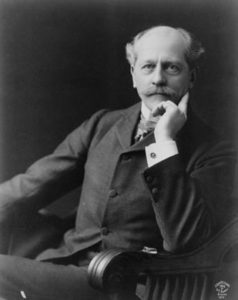
As an undergraduate at Harvard University, Percival was obsessed with astronomy. Everyone loved his graduation speech about the formation of the solar system. Nevertheless, Percival, being the good son that he was, gave up star-gazing and went to work at the family’s cotton mill.
After six long years he was unable to find fulfillment at the cotton mill. So, Percival took a few years off and traveled around the Far East.
 When Lowell was 38 years old, he read a book about Mars that changed his life. The author of this book, Giovanni Schiaparelli, was an Italian astronomer who had been observing Mars for years. He believed that all kinds of canals covered the surface of Mars. His ideas caught the imagination of Percival Lowell, who decided to devote the rest of his life to his first love — astronomy.
When Lowell was 38 years old, he read a book about Mars that changed his life. The author of this book, Giovanni Schiaparelli, was an Italian astronomer who had been observing Mars for years. He believed that all kinds of canals covered the surface of Mars. His ideas caught the imagination of Percival Lowell, who decided to devote the rest of his life to his first love — astronomy.
Lowell came out to Flagstaff, Arizona, in 1894 when it was still the Wild West. He set up his observatory on top of “Mars Hill,” picking that spot because it was almost 7,000 feet above sea level. At this time Flagstaff was a small town with very little light pollution. 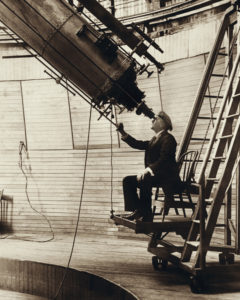 As things turned out, one of Lowell’s greatest contributions to astronomy was his common sense idea that it’s a good idea to set up your telescope high up on a hill far away from big city lights.
As things turned out, one of Lowell’s greatest contributions to astronomy was his common sense idea that it’s a good idea to set up your telescope high up on a hill far away from big city lights.
Percival Lowell believed Martians had an advanced civilization, but were in some kind of climate crisis. They were digging canals in order to tap their last source of water on their dying, drying planet, the water in its ice caps.
When Lowell published his ideas, Schiaparelli grew very annoyed with him. Something major had been lost in translation. “Canalis” in Italian means channels, as in natural waterways like the English Channel. Schiaparelli didn’t mean “canals” like the ones in Venice. Yet Lowell refused to correct himself.
However, his ideas did not annoy the public, in fact, 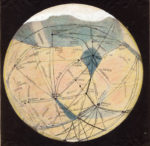 people loved the notion of Little Green Men just one planet from earth. Lowell’s maps of Mars made astronomy so popular that Lowell became the Carl Sagan of his times. His books and maps inspired all kinds of science fiction books and comics about intelligent life on Mars.
people loved the notion of Little Green Men just one planet from earth. Lowell’s maps of Mars made astronomy so popular that Lowell became the Carl Sagan of his times. His books and maps inspired all kinds of science fiction books and comics about intelligent life on Mars.
Besides firing up the public about Mars, Percival Lowell’s other big contribution was the discovery of Pluto. He believed (wrongly) that the orbits of Neptune and Uranus were wobbling because another planet must be out there affecting them. He named it Planet X. Lowell also observed “spokes” on Venus.
 However, he was only a little bit right. Neptune and Uranus weren’t wobbling. Venus did not have spokes. Lowell was seeing spokes because he was probably looking at the blood vessels in his own eyes, having screwed up the lens in his telescope. Nevertheless, fourteen years after Percival Lowell died, astronomers at Lowell Observatory did find Planet X, which they named Pluto. Pluto has since been downgraded to a dwarf planet.
However, he was only a little bit right. Neptune and Uranus weren’t wobbling. Venus did not have spokes. Lowell was seeing spokes because he was probably looking at the blood vessels in his own eyes, having screwed up the lens in his telescope. Nevertheless, fourteen years after Percival Lowell died, astronomers at Lowell Observatory did find Planet X, which they named Pluto. Pluto has since been downgraded to a dwarf planet.
I like to think that Percival Lowell was a friend of Daniel Barringer. Barringer lived just 30 miles east of Flagstaff, and was spending his whole life digging for iron in a meteor crater. Just as Lowell was wrong about Little Green Men and Planet X, Barringer was wrong about the Giant Meteor Crater. What a wild place northern Arizona must have been in 1900!
Today you can visit both the Giant Meteor Crater and Lowell Observatory.. Just the view of Flagstaff from Mars Hill is worth the trek up there.
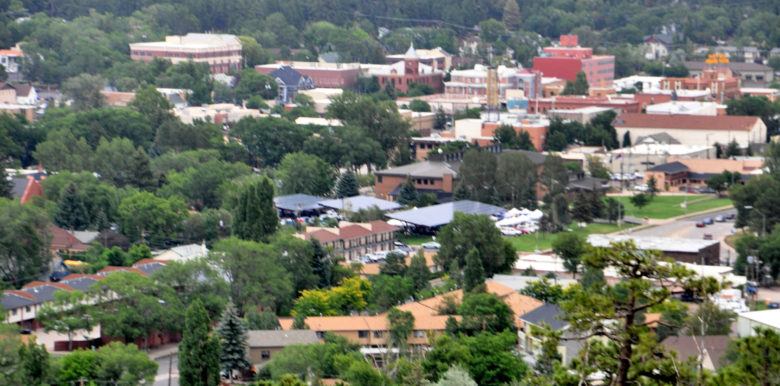
You can sense the spirit of Percival Lowell and his intense curiosity about the entire cosmos as you visit his observatory and telescopes.
I think he’d have liked that Time Magazine once designated Lowell Observatory as one of the 100 Most Important Places in the World.
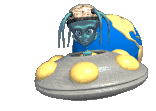
A little update (as if timeless topics like astronomy have updates):
On March 29, 2024, the Governor of Arizona declared Pluto to be Arizona’s official planet, even though Pluto has been downgraded to not-a-planet. Or if it is a planet, it’s been downgraded to only-a-dwarf.

